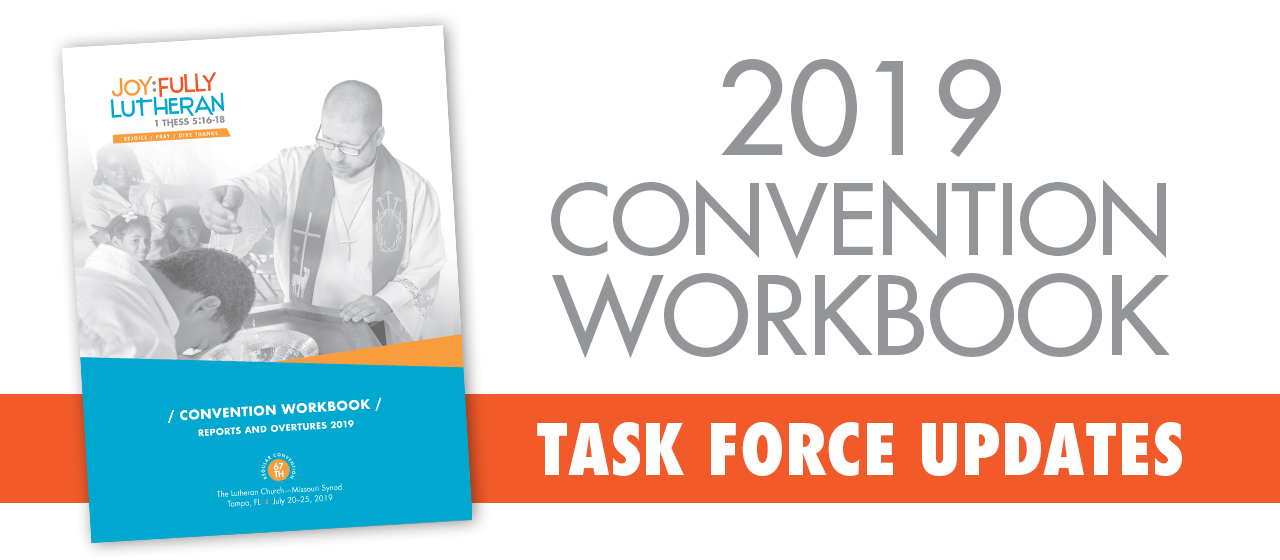Resolution 4-03B
LCMS 2016 National Convention

Resolution 4-03B — To Convene Task Force to Review Recognized Service Organization Program and Bylaws
The task force’s final report begins on page 329 in the Convention Workbook.
Summary
The RSO program is intended to be a benefit to the Synod and its members by recognizing organizations that foster the mission and ministry of the church, engage in program activities that are in harmony with the programs of the boards of the Synod, and respect and do not act contrary to the doctrine and practice of the Synod (Bylaw 6.2.1).
Over recent years, these organizations have experienced challenges to their liberties to operate as a religious entity, government restrictions tied to funding received, a decrease in donor support, and the changing attitudes of communities.
Sometimes these issues have put RSOs in a difficult position to choose either to maintain LCMS recognition or to continue program operations.
Resolution Text & Task Force Members
Purpose
The purpose of the task force is to:
1. Review and report on the original purpose and intent of the RSO program and its predecessors;
2. Determine the needs of and benefits to the Synod with respect to the RSO program;
3. Identify the best model for the Synod to engage with organizations that foster the mission and ministry of the church and that engage in programs that are in harmony with the programs of the Synod;
4. Recommend changes to the RSO program, and/or the elimination of the program, and/or replacement of the current program with a new relationship model that provides benefit to the Synod and the social service agency, and/or develop and recommend other solutions;
5. Recommend appropriate changes to the LCMS Bylaws, as needed; and
6. Ensure that all recommendations maintain the important relationships with the agencies that are recognized by the LCMS, foster the mission and ministry of the church, engage in program activities that are in harmony with programs of the Synod, and respect and not act contrary to the doctrine and practice of the Synod.
The task force’s report is due by Aug. 1, 2018, and will be included in the 2019 Convention Workbook.
Status Updates
Feb. 13, 2017
The task force began the meeting with a review of the current RSO Agreement document, which outlines the bylaw requirements for Recognized Service Organizations.
Further discussion focused on the budget and expenses of the current RSO program, the wide variety of types of organizations granted RSO status and related complications, review of rostered worker involvement with non-school RSOs, and LCMS representation on RSO board
Lengthy discussion was held regarding the valuation and expectation of the RSO program from the CEO’s perspective.
The Rev. Dr. John Sias and the Rev. Dan Gilbert led the members in a review of their research regarding the issues related to the employment of rostered workers by RSOs and other entities, recognized or not.
Discussion will continue on these matters at the next task force meeting to be scheduled.
Dec. 12, 2016
Newly added members Rev. Max Phillips (executive director of Lutheran Family Services of Iowa and Lutheran Home for Perry, Iowa, and chairman of the LCEF Board of Directors) and Ron Drews (president and CEO of Lutheran Social Services of Southern California, a.k.a. LSS Community Care, and formerly president and CEO of Lutheran Social Services of New York) joined the meeting.
For the bulk of the meeting, Chairman Kevin Robson led a discussion including philosophical questions, narrower topics from the Synod’s perspective and from the RSO perspective, and questions specifically regarding the internal function of the task force.
Questions posed included, but were not limited to: Why does the program exist? What aspects of the RSO program most powerfully advance the mission and ministry of the Synod? Are the current criteria adequate?
Sub-committees were then given assignments and agenda items to work on for the next meeting, which was tentatively scheduled for Feb. 13, 2017.
Oct. 24, 2016
The first meeting of the task force was held in St. Louis in October 2016. Discussions at this meeting ranged over a variety of concerns that have been raised with the RSO program as it has been formulated over time.
Noted also was the exceptionally broad scope of outcomes allowed to be proposed by the task force, but also the tensions inherent in the assignment, especially for social service organizations, which have significant regulatory and funding-related challenges to their “respect[ing] and not act[ing] contrary to the doctrine and practice of the Synod.”
The task force used this first meeting to review the history of the RSO program, beginning back in the mid-1800s with the Lutheran hospital, orphanages, care for the widows and those suffering calamities.
Significant discussion was held to identify the benefits and challenges of the RSO program. Before closing the meeting, the task force turned its attention to identifying CEOs/presidents of two RSOs to invite to serve on the task force as required by the resolution.
The members present elected the Rev. Kevin Robson as chairman of the task force. The next meeting is scheduled to take place in December 2016.